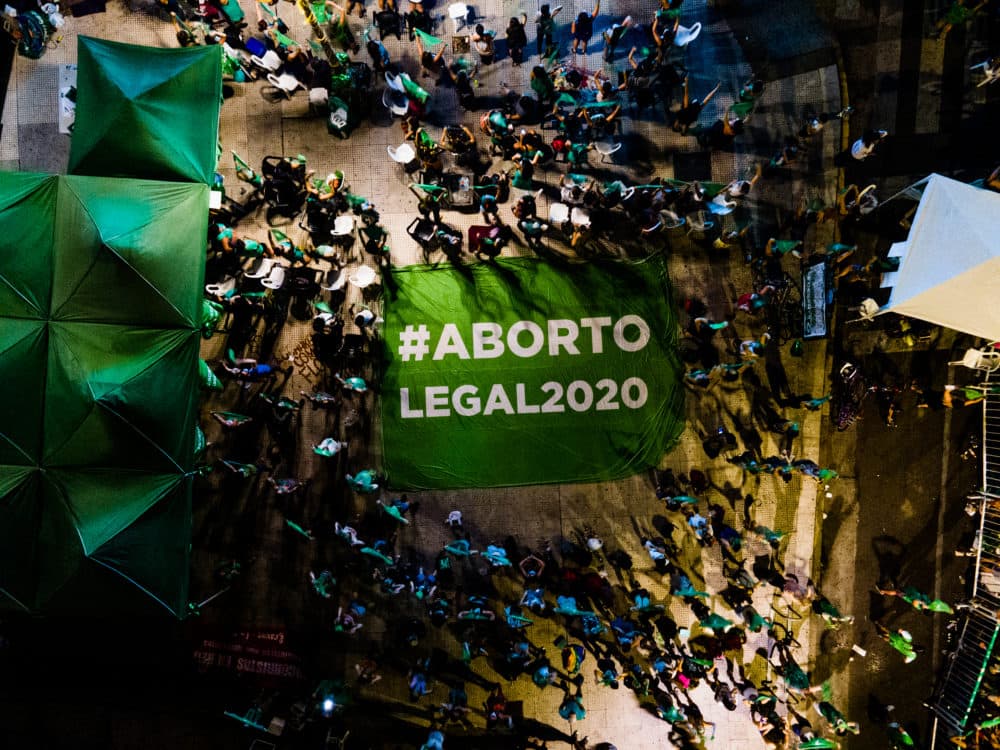Advertisement
In Latin America, abortion access is expanding. Why is the U.S. moving in the opposite direction?
Resume
For abortion rights advocates in the U.S., Latin America has long been a cautionary example:
"The people dying from the abortion ban in El Salvador? They're women whose doctors are afraid to operate on an ectopic pregnancy," law professor Michelle Oberman says.
"They're women whose doctors are afraid to treat their breast cancer with chemotherapy. The single biggest cause of maternal death? It's suicide by a pregnant teenager."
But now, it's the United States that's restricting abortion access.
Meanwhile, in Latin America, attitudes about legalizing access to abortion have been expanding.
"You can see the change of attitudes towards this public opinion," Cora Fernandez Anderson, a political scientist, says. "It just only took two more years and then abortion is legalized."
Today, On Point: The U.S. moving in one direction, much of the world in another. We talk about why.
Guests
Michelle Oberman, law professor at Santa Clara University. Author of Her Body, Our Laws.
Cora Fernandez Anderson, assistant professor of comparative politics at Mount Holyoke College. Contributor to Ms. Magazine, where she covers the reproductive rights debate in Latin America. (@CoraFernandezA1)
Jack Beatty, On Point news analyst. (@JackBeattyNPR)
Also Featured
Catalina Martínez Coral, regional director for Latin America & the Caribbean at the Center for Reproductive Rights. (@catamartinezc)
Show Highlights
MEGHNA CHAKRABARTI: We're taking a look at why the United States is moving in the opposite direction of much of the rest of the world regarding abortion access. And we're going to focus specifically right now on Latin America.
Because the historically conservative and Catholic part of the world has actually been undergoing several significant changes regarding access to abortion.
... Colombia, as I mentioned earlier, is the latest one. In February of this year, just a couple of months ago, the Colombian Supreme Court delivered a 5-4 ruling making abortion legal until 24 weeks of pregnancy, essentially decriminalized abortion, which had been extremely restricted in Colombia for decades prior to that.
The Colombian Supreme Court delivered a 5-4 ruling making abortion legal until 24 weeks of pregnancy.
And Judge Alberto Rojas Ríos, who co-wrote the ruling in favor of decriminalization, he called the decision, quote, 'A symbol of the internal fight for women's freedom.'
Now, that ruling was the result of a court case brought by a group called Causa Justa, or the Just Cause Movement, a coalition of abortion rights groups. Catalina Martinez Coral is regional director for Latin America and the Caribbean at the Center for Reproductive Rights in Bogotá. She's one of Causa Justa's leaders.
CATALINA MARTINEZ CORAL: In Colombia, since 2006, we had a decriminalization of abortion under some grounds. Only, for example, when the life or health of the woman was in danger, or when the pregnancy was the result of a rape, or when the fetus had a fatal malformation.
And what we wanted to do in Colombia with the Causa Justa movement, was to be able to liberalize abortion and to really decriminalized abortion. Actually, what we were looking for was the total elimination of abortion from the penal code. This was, of course, a legal fight, but it was also a social fight.
This was, of course, a legal fight, but it was also a social fight.
CHAKRABARTI: Recognizing that it was a social fight in Colombia was important to Causa Justa. And Catalina says, therefore, they focused on reducing the taboo around discussing abortion. And pushed to get it into the mainstream conversation.
MARTINEZ CORAL: We wanted really to create a momentum in the country. And during the two years that the litigation was held, we were also doing a lot of mobilizations. We took to the streets, we did several events.
We created videos for social media with actors, very well known celebrities, very well-known in the country, to really fight stigma around abortion, to explain why it is important to continue advancing the recognition of these rights. And to really be able to explain and create support in general.
CHAKRABARTI: Catalina also says Colombian activists knew that a public campaign would sway the court. So that connection there between the social fight and the legal fight, because, of course, the court is the place the decision would ultimately be made.
MARTINEZ CORAL: Even if judges, of course, are deciding this decision, taking into consideration law and impartiality and following their role as judges. I think it was important for them, as well, to understand that the society was understanding the subject and was prepared also for this new step in the recognition of our rights.
The society was understanding the subject and was prepared also for this new step.
CHAKRABARTI: Now, newly won social changes can seem fragile or even hard fought. Older social changes can also seem fragile as well. But Catalina believes that the expansion of abortion access put into effect by the Colombian high court's ruling is not likely to be reversed any time soon.
MARTINEZ CORAL: We don't see that a retrogression is possible in the country in the near future. Decision of the court has immediate effect.
But of course, the Congress or the Ministry of Health will play a very important role in creating an integral policy on sexual and reproductive health services. But the right to abortion is already recognized, and it is impossible in the near future to return what the court has already decided.
The right to abortion is already recognized, and it is impossible in the near future to return what the court has already decided.
Related Reading
Journal of Law and the Biosciences: “What Will and Won’t Happen When Abortion is Banned” - "For the past 50 years, abortion opponents have fought for the power to ban abortion without little attention to how things might change when they won."
Ms. Magazine: "Chile Becomes First Country in the Americas To Protect Abortion Rights in Its Constitution" — "With the recent inclusion of abortion rights in the Chilean Constitution, a first of its kind in the hemisphere, the growth of Latin American feminisms is seemingly unstoppable."
This program aired on May 9, 2022.

